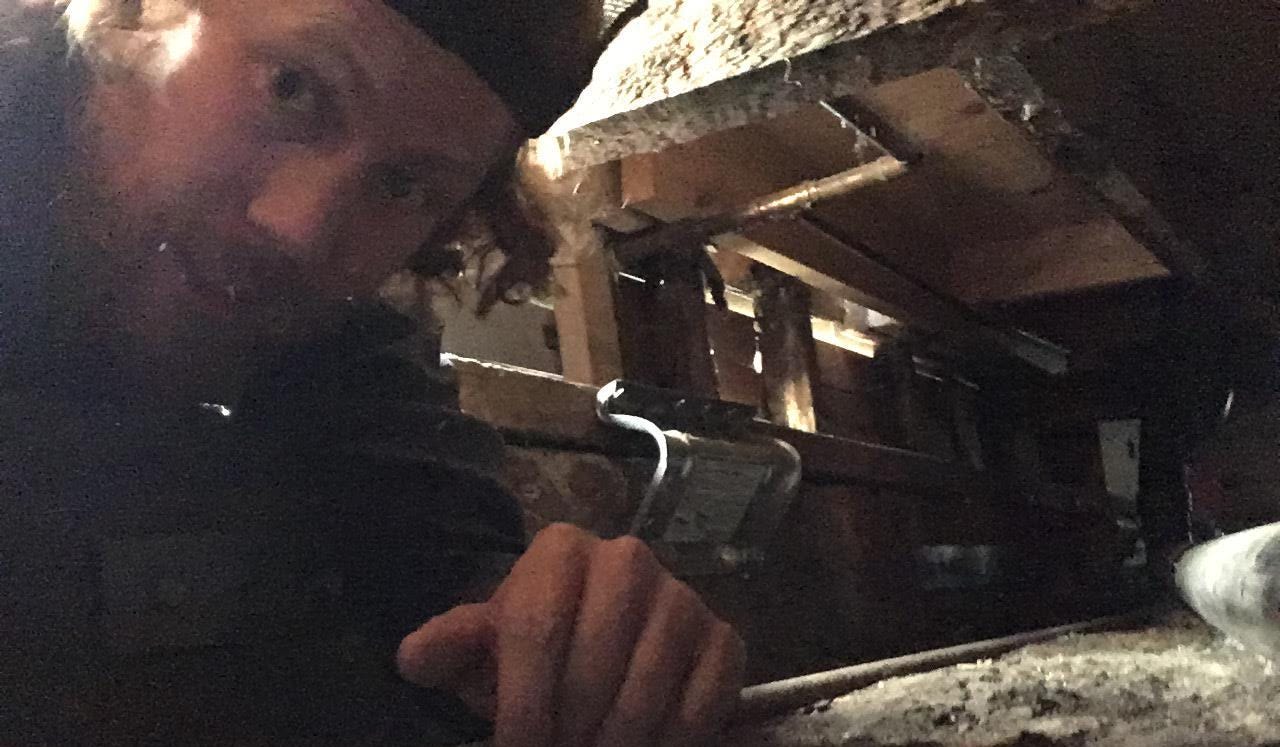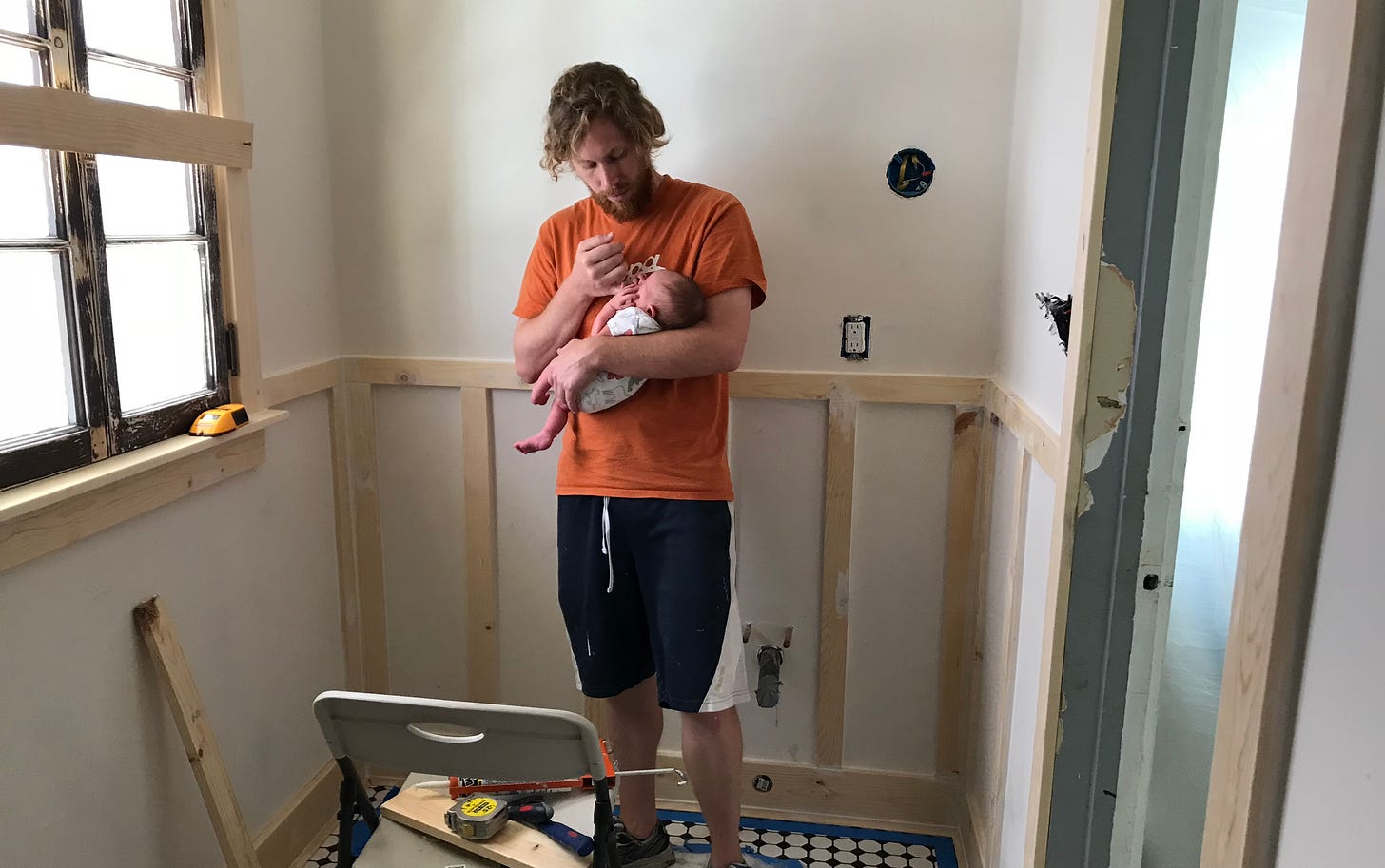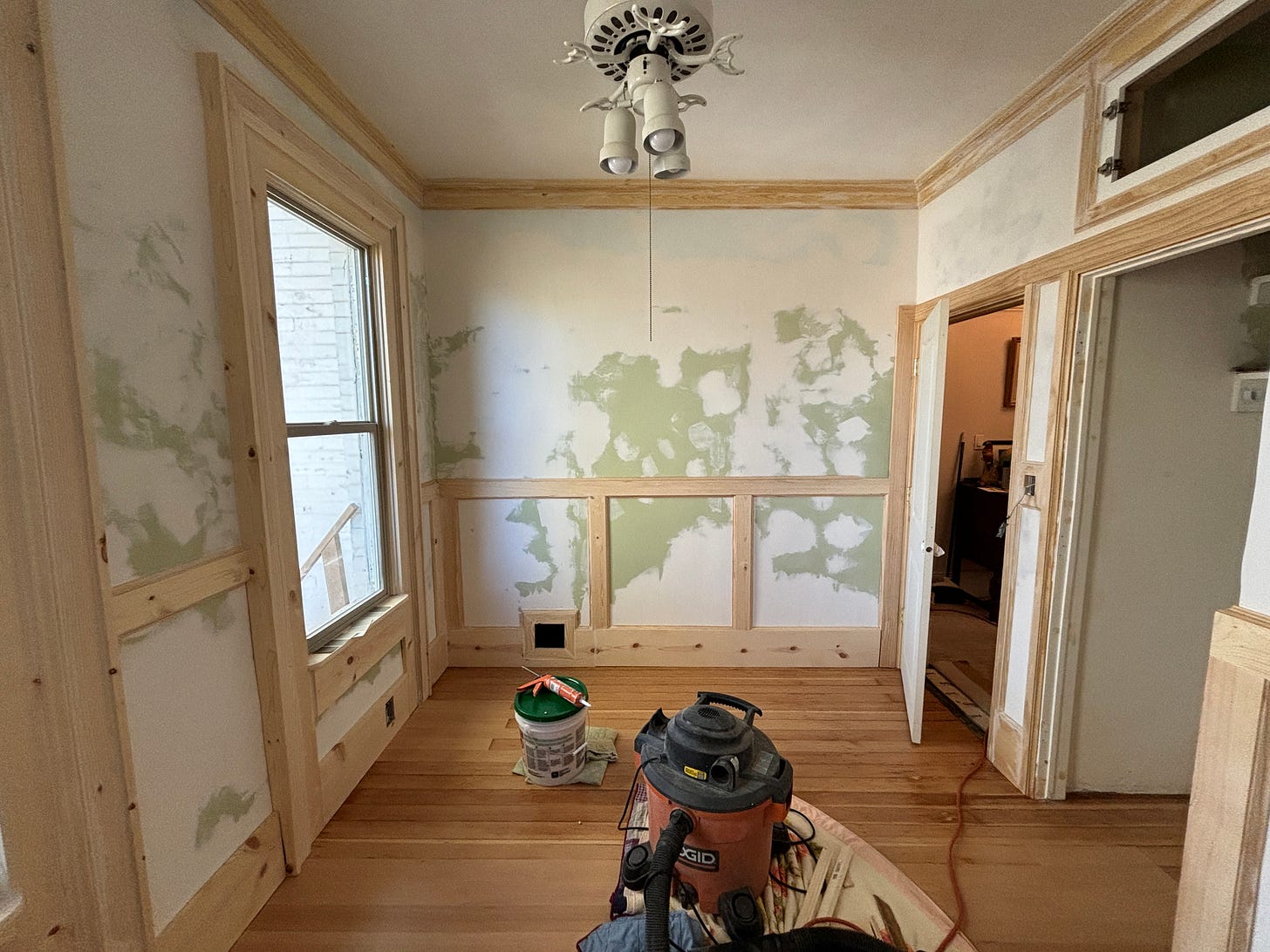What I've learned from remodeling
I learned how to do construction, and how to see the world, from family
Thanks for checking out Nuclear Meltdown. If you’ve ever spent four months on a weekend home improvement project, subscribe now!
Since the beginning of February, our family has been remodeling our guest bedroom/office. It’s the smallest room in our house, but the project has nevertheless spiraled into a multi-month affair, as these projects are wont to do. It has been a collaborative project by the whole family, but I’ve been doing most of the physical labor myself every night, every weekend, every waking second when I don’t have other commitments. To say it’s a relief that the end is finally in sight — we’re painting now — is an understatement.
But amid all these hours of knocking down lath and plaster in the middle of the night, I’ve had a chance to reflect on just how exactly I acquired the skill set to do a project like this. And as it turns out, it was not through any formal training or even (mostly) via YouTube videos and online tutorials. Instead, I learned pretty much everything I know about doing construction through my extended family village. And not only that, the process of learning these skills actually molded my worldview in unquantifiable ways.
This little room remodel consequently strikes me as a case study in the huge benefits of having a strong family network.
Here’s the story:
As I mentioned in my recent Hearth Matters interview, my home improvement journey really began1 when my wife and I bought a very run down, 750-square-foot house in East Hollywood in 2016. Our first step in the house was to hire a contractor to remodel the kitchen, and it turned out great. But soon, as we awaited the arrival of our first child, we began thinking about other improvements. Just as an example, the floor in the bathroom was rotting out, a window was permanently ajar, the bedroom included multiple different kinds of flooring, there were holes in the siding, an opossum was living in the wall, and so on.
We initially got a quote from our contractor to do the work we wanted, but his bid was so high it was clear he didn’t want to do it. So instead, we turned to a retired uncle with years of construction experience.
This uncle came up and stayed with us for the better part of two months, most of which was spent in Airbnbs because our water and electricity had to be shut off during construction. I worked a late shift at the time, so typically I’d get up and do construction with our uncle for a few hours, then go to my real job (a breaking news reporter at BuzzFeed News) and he’d continue working through the afternoon. On weekends, work might go on as long as there was daylight.
I don’t want to overestimate my contributions or skills here. The uncle did much more work on the project than I did, and he was much faster because he had decades of experience. And even now, if you come see my very uneven drywall work or wonky framing, you will discover that my skills remain limited.
But this project was the first time I hung drywall. I also learned about installing cement board around a shower, grouting tile, framing walls and many other things. The project was one of the first times I ever used a power saw2. On one memorable day, we discovered the plumbing had been installed incorrectly (we had hired a plumber for part of the project) so I shimmied into a crawl space to find out where toilet water was flowing into the dirt under the house. And we fixed the problem.

What really surprised me during the project, though, was the improvisational way our uncle went about solving problems. He used whatever tools were on hand — things like beat up old drills that came from yard sales, or a small circular saw that he used for pretty much all cuts — and every day he figured out how to solve new problems that he hadn’t exactly encountered before. He also knew where improvising could work without sacrificing quality, and where to play by the rules.
By the end of the project I had sort of absorbed this same philosophy. For example, I went to an architectural salvage shop, bought two window sashes, built a frame around them, and installed it in a wall. I even reversed the direction the windows swung. Six months earlier, I wouldn’t have thought that such a thing was even possible for anyone, let alone that I’d be trying it myself.
Fast forward six years, and I’ve ended up trying all sorts of new things on our current project. I hung two doors, created a sort of built in cabinet, and did more mitered cuts with a chop saw than I can count. I had no idea how to do any of these things three months ago. Now I do (mostly, if not always well).
I know that for people with experience in the trades, or who are just avid home DIYers, this may all sound silly. Plenty of people know how to do all of these things, and most of them are surely better at them3.
But my point is less about these specific skills, and more about inherited knowledge generally. Having a big, robust extended family gave me access to an entirely new skill set, and it was one I hadn’t picked up through any other networks or educational experiences. And I think that’s the underlying principle here that applies to families generally, no matter what their specialities happen to be.
Put another way, a big village provides members with a generalist education, which I’ve found to be especially useful in a time when many of us are pushed to specialize, sometimes to the extreme.
The benefits of this education are legion. I didn’t bother getting bids for this little room remodel we’re doing right now, but based on other work we’ve had done in our area I suspect it would’ve cost at least $10,000, and maybe much more. And that’s just this project. We’ve also done many other projects over the last several years that would have cost even more money. It’s hard to quantify all that work, but I wouldn’t be surprised if it added up to $50,000 or more. That’s more money than I spent on college. It’s more than the down payment on my first house. It’s nearly twice the yearly salary of my first post-college job4.
The value of a village education is huge.
And then of course there’s the worldview. Working alongside a skilled family member taught me that construction isn’t rocket science, it’s a sequence of little puzzles that need solving. And that’s true of most things. I suppose I was an adequately capable problem solver in my little specialist areas before I did all this construction, but working in a proverbial left field with a patient expert helped me see how to problem solve in completely different arenas. It reinforced an internal locus5 world view, which not only gives me the confidence to hang doors and drywall, but also shapes the way I approach all sorts of problems. If you can build a wall, you can probably figure anything out.
It’s impossible to quantify all of this. But years after that East Hollywood6 remodel, my wife and I were talking about the work we did and one of us remarked that the project made us into who we are today. It became a pivotal moment (or, several long months of moments) that changed our trajectory in ways we’ve only grasped years later. That’s what a village can do.
We were deeply fortunate to have had such an experience. And today, it has only further convinced me that everyone should have a village.
Thanks for reading to the end of this project. If you enjoyed this post, consider sharing it with a friend.
I want to give a special shout out to my father-in-law here, who helped us extensively with many projects, including on the Hollywood house I discuss above. Among other things, he also gave us our first power saw, taught us how to do mitre cuts, and spent hours sanding old wood. We’ve since worked together on several other projects, including building the world’s strongest pony wall. And he even did the electrical in our current remodel. If our remodeling journey were a novel, it would include several chapters about my father-in-law. The reason I’ve focused on the work I did with an uncle here is in part to be more concise. But it’s also because that work, specifically, was such a beast, lasted so long, and came at such a pivotal moment for my wife and I that it felt like a uniquely educational experience. But someday I’ll write a part two about other projects with other members of my family.
I was an English major.
My favorite saying: “do your best and caulk the rest”.
It was a reporter job at a local newspaper, which is interesting but not lucrative work.
Eventually we moved out of East Hollywood and, as I’ve written before, opted to settle in Salt Lake because it had the highest concentration of our family members.





